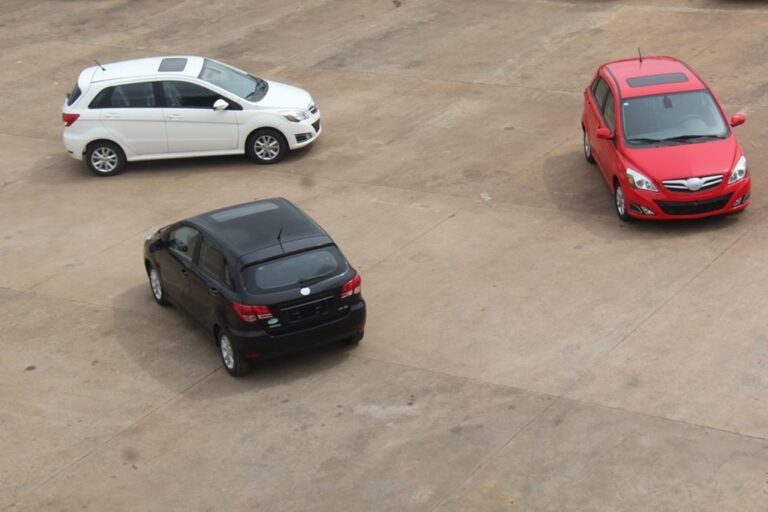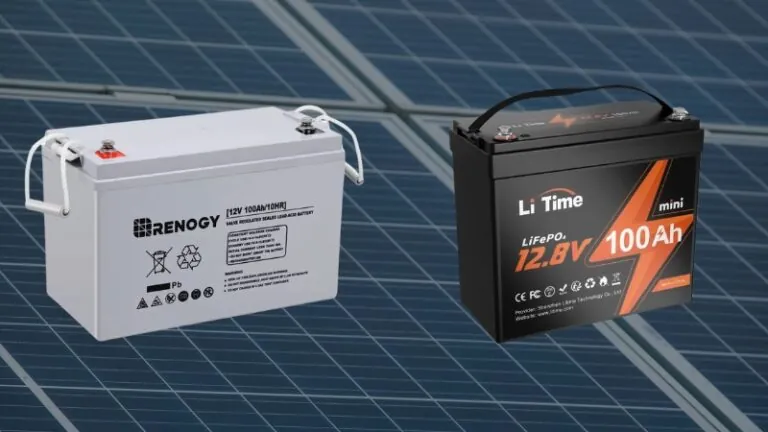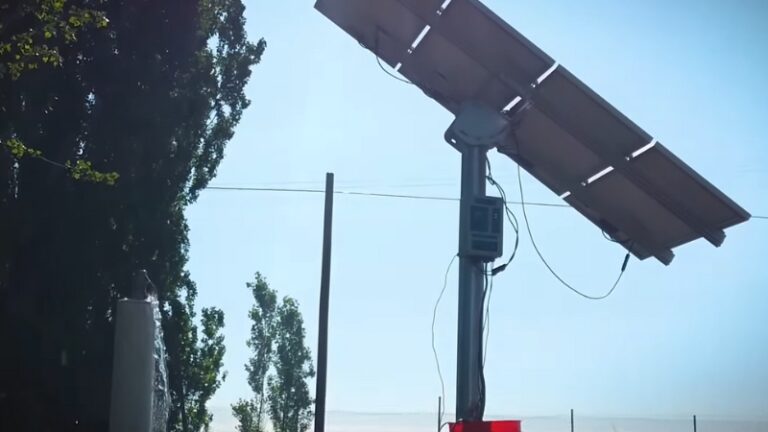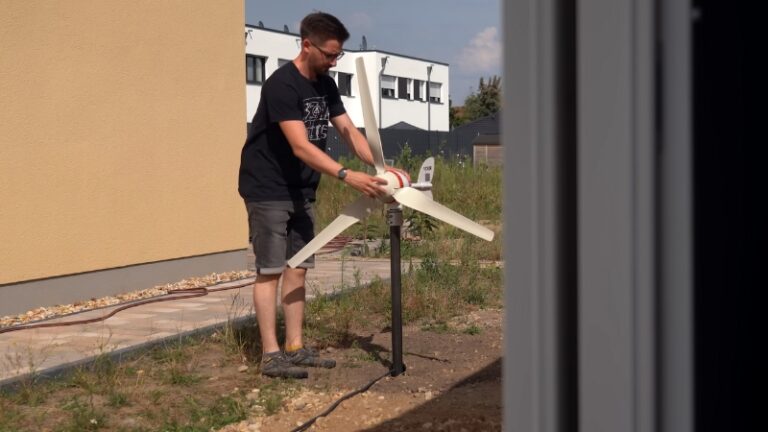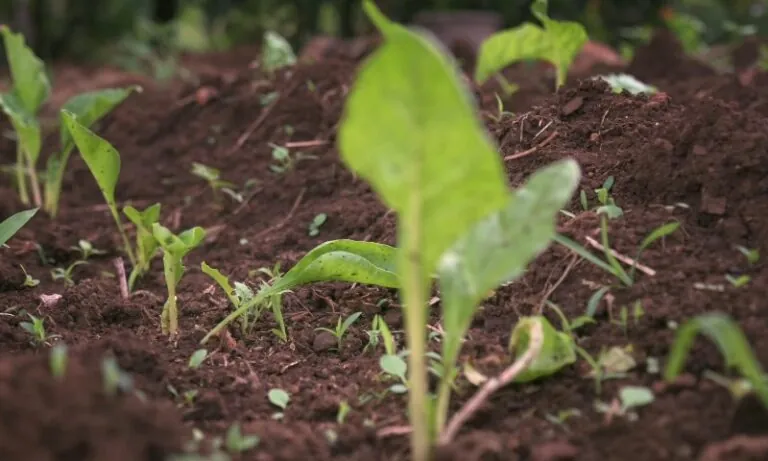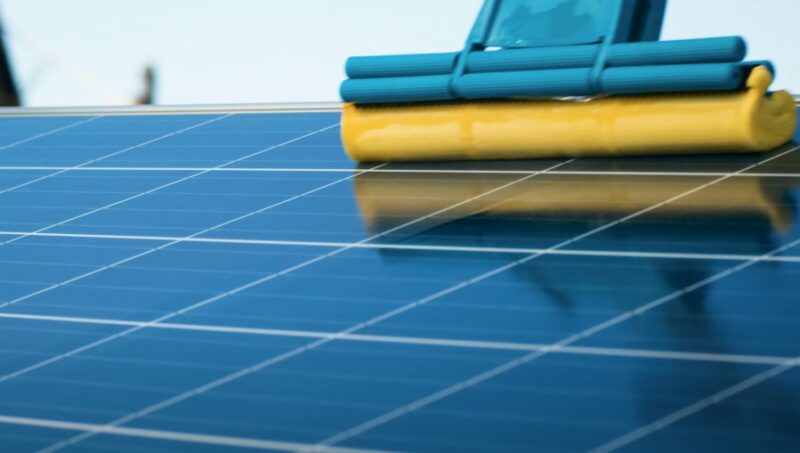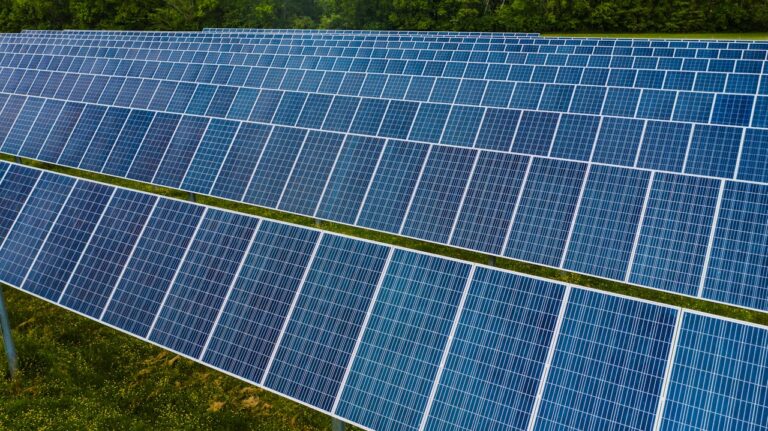Solar panels stand out as a popular and effective solution for generating clean electricity. However, like any significant investment, they require proper care and maintenance to function optimally.
The necessity of cleaning and maintaining these is often overlooked, yet it plays a crucial role in the efficiency and longevity of these energy-generating systems.
The Importance of Maintenance
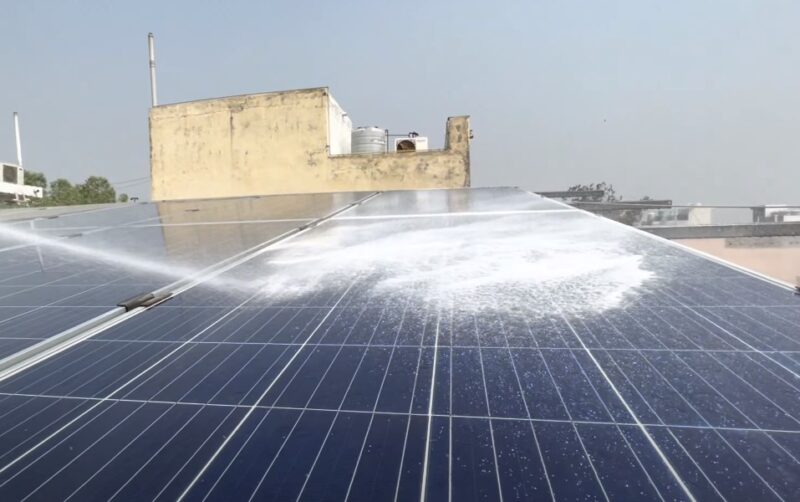
Firstly, we want to talk about the importance of maintaining solar panels.
Accumulation of Dirt and Its Effects
Solar panels are exposed to various environmental elements that lead to the accumulation of dirt. This dirt can include:
- Airborne dust particles
- Tree sap
- Lichen
- Soot
- Bird droppings.
When these substances accumulate, they can create shading on the solar panels, significantly reducing the amount of sunlight reaching the cells. This reduction in sunlight exposure directly impacts the system’s performance, leading to poor efficiency and, consequently, financial loss for the owner.
What Happens if You Don’t?
The consequences of allowing solar panels to remain dirty are substantial. Dirty panels can lose efficiency and have a shortened lifespan. They may also suffer from reduced overall system performance, which can lead to a decrease in the amount of electricity generated.
This not only affects the financial return on the investment but can also lead to permanent module staining, which is difficult to reverse.
Benefits of Regular Cleaning
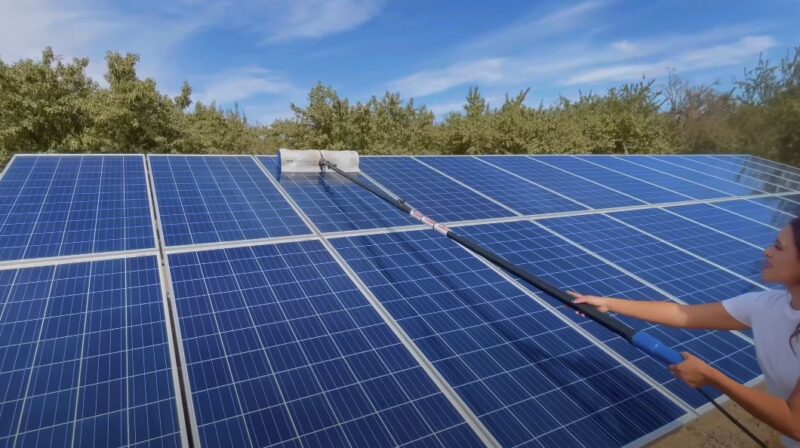
Regular cleaning of solar panels is crucial for several reasons.
Ensuring Maximum Solar Output
One of the primary benefits of regular cleaning of solar panels is the assurance of maximum energy output. Dirt and debris on the surface can block sunlight, significantly reducing the panels’ efficiency.
By regularly cleaning the panels, you remove these obstructions, allowing the maximum amount of sunlight to reach the photovoltaic cells. This ensures that the panels operate at their highest possible efficiency, converting as much sunlight as possible into electricity.
This is particularly crucial for those relying on this sort of power as a significant source of their energy needs, as it guarantees the best return on their solar investment.
Warranty Preservation
Many solar panel manufacturers include regular maintenance and cleaning as a condition in their warranty agreements. Neglecting to clean your solar panels can lead to a void in the warranty, which could be costly in the event of a malfunction or damage.
By adhering to a regular cleaning schedule, you not only keep your panels in top condition but also ensure compliance with warranty requirements. This can be especially important if you encounter issues that need professional repair or replacement, as a valid warranty can significantly reduce potential costs.
Investment Longevity
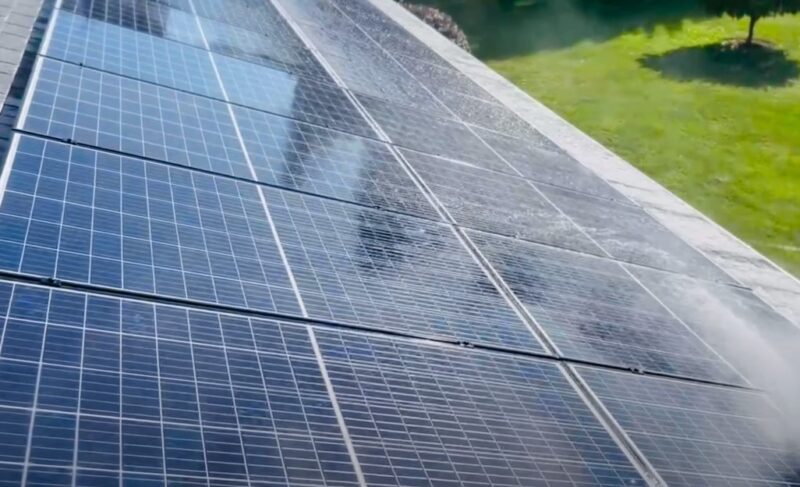
Regular cleaning of solar panels is an investment in the longevity of the system. Accumulated dirt and grime can cause permanent staining and even physical damage to the panels over time. By keeping the panels clean, you prevent such deterioration, thereby extending the lifespan of your solar investment.
It means you can enjoy the benefits of solar energy for a longer period without the need for premature replacements or repairs, which can be expensive. In the long run, the small expense and effort of regular cleaning can lead to significant savings.
Peace of Mind for Owners
Regular cleaning of solar panels offers peace of mind. Knowing that these are well-maintained and functioning at their best capacity can be reassuring. It means you are making the most out of your renewable energy source and contributing to environmental sustainability.
Well-maintained ones can improve the aesthetic appeal of your property and reflect well on your commitment to clean energy. This peace of mind is invaluable, especially for those who view them as a long-term investment in both their financial and environmental future.
Maintenance Techniques
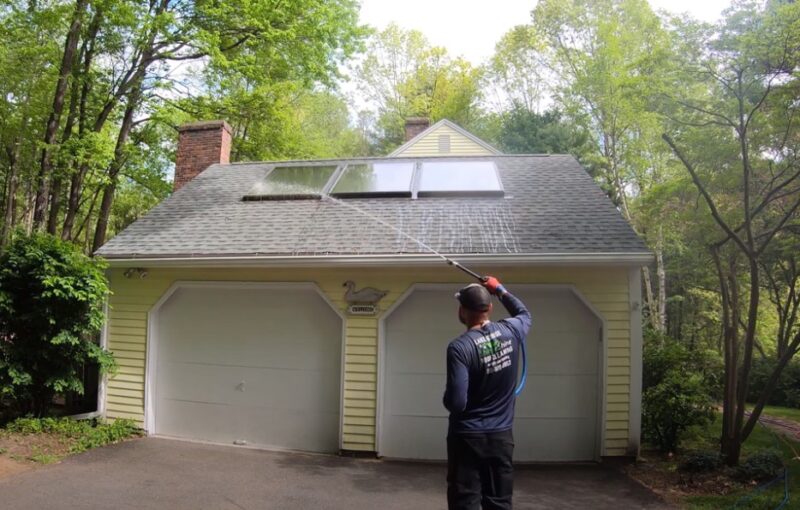
Now that we know all about importance, we should discuss different maintenance techniques.
Effective Cleaning Methods
Cleaning solar panels is not a complex task, but it requires the right approach to avoid damage. The recommended method involves using soft, lukewarm water and a non-abrasive sponge. This gentle cleaning prevents scratches and damage to the panels.
It’s important to avoid using very cold water on warm panels, as this can cause thermal shock and damage. Similarly, hard water should be avoided as it can leave white residue, diminishing the panels’ efficiency. For safety and ease, using a telescopic pole is advised to avoid the risk of climbing onto the roof.
What to Avoid When Cleaning
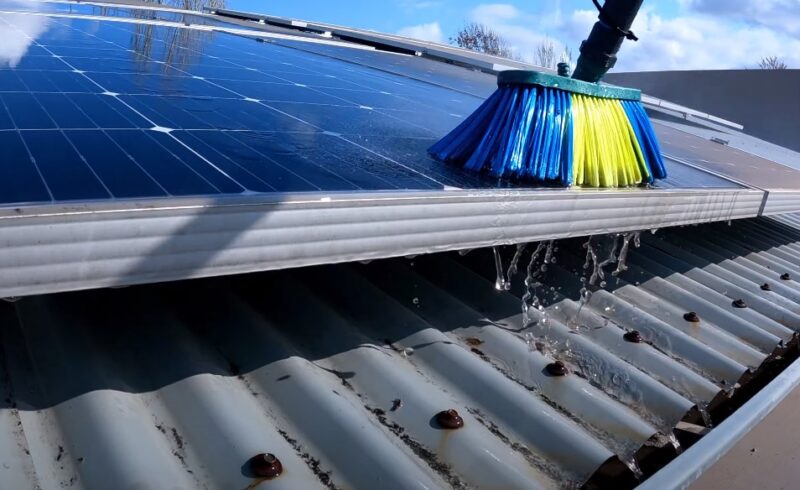
Certain cleaning products and methods can harm solar panels. Abrasive sponges can scratch the panels, and high-pressure water can damage the panel joints. Solvents and detergents are also not recommended as they can damage the surface of the solar collectors. The key is to clean effectively without causing any harm to the panels.
Maintenance of Different Types
When it comes to solar panel maintenance, it’s important to recognize that not all panels are created equal. Different types of solar panels, such as photovoltaic, thermal, and hybrid, each have unique maintenance requirements.
Knowing these differences is key to ensuring that your solar panels continue to operate efficiently and effectively over their lifespan. Regular maintenance not only enhances the performance of the panels but also helps in identifying potential issues before they become major problems.
| Solar Panel Type | Maintenance Requirements | Key Points |
|---|---|---|
| Photovoltaic Panels | – Regular cleaning with soft, lukewarm water and a non-abrasive sponge. – Annual check of cables, output meter, and inverter. – Visual inspection for physical damage. |
– Minimal technical maintenance required. – Reliable and sturdy, with a long operational life. |
| Thermal Solar Panels | – Annual maintenance by a professional. – Check water pressure and glycol levels. – Inspect for fluid leaks and verify the operation of safety devices. |
– Requires more rigorous maintenance. – Manufacturer’s guidelines should be followed for specific care instructions. |
| Hybrid Solar Panels | – Cleaning similar to photovoltaic and thermal panels. – Check both photovoltaic and thermal components. – Monitor for overheating and efficiency. |
– Combines maintenance needs of both photovoltaic and thermal systems. – Generally, have reduced maintenance costs due to not overheating. |
Inverter and Housing Maintenance
In addition to panel cleaning, maintaining the solar inverter is crucial. This involves annual cleaning of air inlets to ensure proper cooling and checking indicator lights and displays. The inverter, typically with a service life of about 10 years, plays a vital role in converting solar energy and needs regular maintenance to prevent productivity loss.
Common Misconceptions
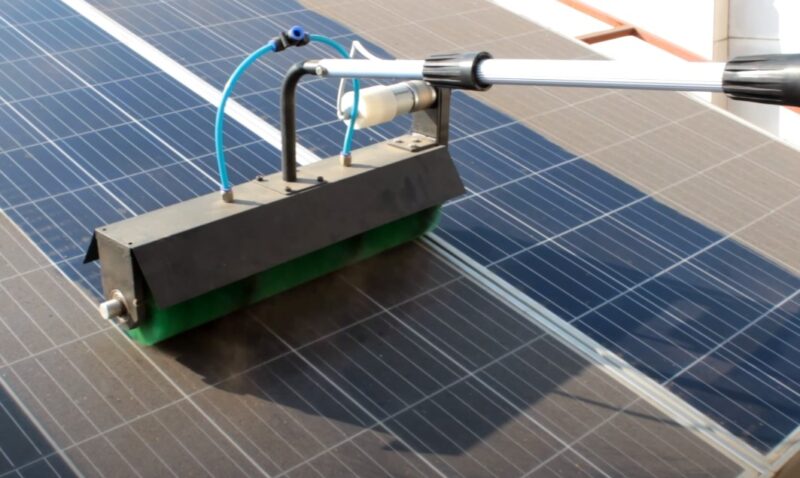
A common misconception is that they are self-cleaning and require minimal maintenance. While some are marketed as ‘self-cleaning’ due to their hydrophobic surfaces, this does not mean they are maintenance-free. In reality, these surfaces only reduce mineral residue but do not prevent dust accumulation.
In dusty environments, even a single solar cell becoming inefficient can affect the performance of the entire panel. Therefore, the belief that rain alone is sufficient to keep them clean is misleading. Regular manual cleaning is necessary to ensure optimal performance.
Inadequacy of Rain Cleaning
Relying solely on rain to clean these is often insufficient, especially in certain climatic conditions. In dry areas like Nevada, Arizona, and Utah, the lack of rain leads to significant dust buildup, which rain cannot adequately remove.
Additionally, other elements such as pollen, bird droppings, leaves, ash, and smog can create a layer of surface soiling that rain may not effectively wash away. In some cases, this combination of pollutants can turn into a slurry with rain, further necessitating manual cleaning.
Professional Cleaning Considerations
For solar panels with sticky or stubborn buildup, professional cleaning may be necessary. This is particularly true for large installations or solar farms, where a -5% output due to dirt can translate into a substantial energy shortfall.
While residential users with slightly tilted panels might manage cleaning themselves, flat-laid panels are more prone to dirt accumulation and might benefit from professional services.
The cost of professional cleaning, typically ranging between $130-$500, should be weighed against the estimated energy gain from clean panels.
FAQs
Why is it important to harness solar energy?
Solar energy is a clean, renewable resource that reduces reliance on fossil fuels, decreases greenhouse gas emissions, and provides a sustainable way to meet energy needs without harming the environment.
How can we protect solar panels from the sun?
Solar panels are designed to absorb sunlight, but to protect them, ensure they are installed with durable, UV-resistant materials, and conduct regular maintenance checks to address any wear and tear due to sun exposure.
What protection is needed for a solar system?
A solar system requires protection against physical damage (like from hail or debris), electrical surges, and weather-related issues. This includes sturdy mounting, surge protectors, and regular inspections to ensure all components are functioning properly.
Summary
Maintaining solar panels is not just about preserving their physical condition; it’s about ensuring their continued efficiency and effectiveness in harnessing solar energy. Regular cleaning and maintenance play a pivotal role in maximizing the output and lifespan of solar panels.
If you’re interested in learning more about solar energy, and energy in general, be sure to check out the rest of our website.


